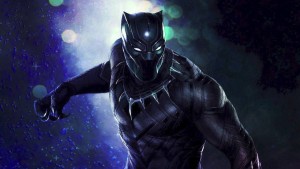Black Panther Says Quite a Bit About All of Us

As someone whose wife as described him as a 40-something 12-year old, I was really interested in seeing Black Panther over the weekend.
I’ve followed the character since I was old enough to read comic books. And somewhere in a storage unit in Springfield, IL is a copy of Avengers #52 when the Black Panther joined the group. And believe it or not, the Panther’s original character’s name was the “Coal Tiger”, no I am not making that up. However, his creators, Stan Lee and Jack Kirby, thankfully, decided to go a different route.
Over the years I have watched the Black Panther assume the identity of a school teacher. I’ve seen the Black Panther get married (in the comic to Storm of the X-Men and later have the marriage annulled) and basically lose his throne and powers and his sister take over. So I think I can speak with some authority on the film and the character.
There’s been a lot of talk about the film and what it means from a social and cultural perspective. I can appreciate African-American kids flocking to a film where they can see heroes that look like them. I do believe it does have an impact. In addition, the folks who say they wanted more positive images of how blacks are portrayed on the big screen can cheer too.
However, what I really appreciated about the film, is that the Black Panther shows just how much African-Americans are just like everyone else.
Without spoiling the film for you, one of the big debates the Wakandans (the place where the Panther comes from) is whether they should use their riches and technology to help the outside world, particularly other impoverished and oppressed nations.
There is an early scene where T’Challa, the Black Panther, talks with one of the tribal chiefs about allowing refugees into their country. The chief basically says it’s a bad idea because if you bring in the refugees, you bring all their problems.
Any of this sound familiar?
The Black Panther also has relationship issues and he finds out his father, King T’Chaka hid a major secret from him that impacted the entire nation.
But perhaps what drove this point home the most was the Panther’s arch enemy, Erik Killmonger who thinks Wakanda should not only use its wealth and power to help “liberate” other nations, but Wakanda should also be the one running show. (Sounds like something Captain America would have to deal with).
Of course, there is only so much you can do in a 2 hour and 15-minute film, but I thought that part of the underlying story was most interesting. That despite the technology and culture of these proud warriors of this hidden country that is helping drive thousands of people to the box office and millions of dollars to Marvel and Disney, at the end of the day, the Wakandans are just like everybody else.
Now go see the film and don’t forget to stay through the credits.

